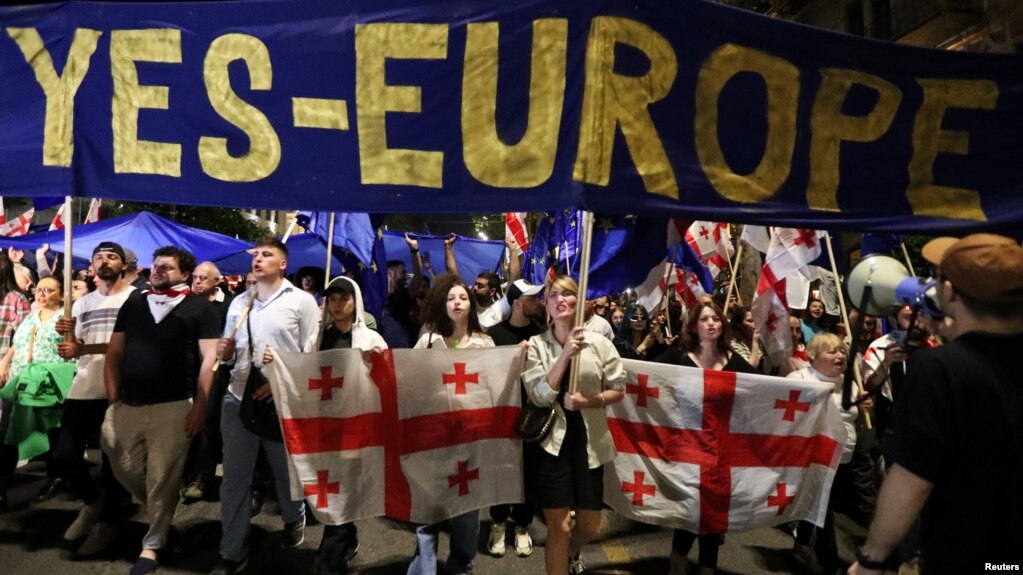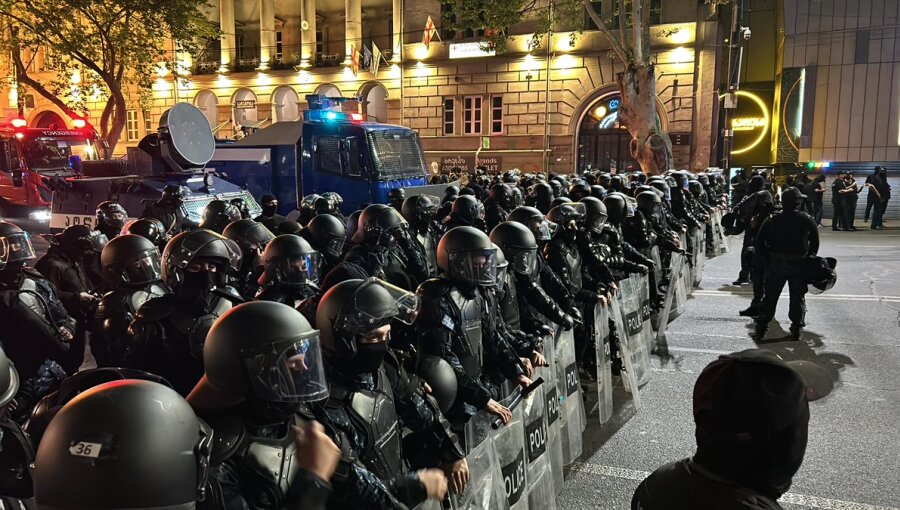April 28, 2024 7
By Reuters

TBILISI, GEORGIA —
Thousands of Georgians marched through the capital, Tbilisi, on Sunday, as protests built against a bill on "foreign agents" that the country's opposition and Western countries have said is authoritarian and Russian-inspired.
Georgia's parliament said it would hold the bill's second reading on Tuesday, with opposition parties and civil society groups calling for mass protests against its expected passage.
If passed, the draft law would require organizations receiving more than 20% of their funding from abroad to register as "foreign agents" or face fines.
Protester Nika Shurgaia said he feared many non-government organizations would be shuttered because of what he called "the Russian law." This label has been adopted by the opposition to compare the bill to a law used to crush dissent in Russia.
"There are hundreds of such NGOs who have done so much good for Georgia and now they face being stigmatized and possibly shut down," Shurgaia said.
The EU and Western countries have warned that the bill could halt Georgia's integration with the EU, which granted Georgia candidate status in December
The bill must pass three readings in parliament to become law, as well as overcome a veto by Georgia's figurehead president, who opposes it.
Groups opposed to the bill have protested nightly outside parliament for over a week, since the legislature, which is controlled by the Georgian Dream ruling party, approved its first reading.
Thousands of student demonstrators have blocked Tbilisi's central Rustaveli Avenue, facing off against riot police.
Opponents of the bill who called the mass protests on Sunday have also called for protests against its second reading on Tuesday. The government has called a demonstration in support of the bill for Monday.
AFP
April 28, 2024

The rally was organised by around 100 Georgian rights groups and opposition parties - Copyright AFP
Irakli METREVELI
Some 20,000 Georgians staged a “March for Europe” Sunday, calling on the government to scrap a controversial “foreign influence” bill which the EU has warned would undermine Tbilisi’s European aspirations.
There have been mass anti-government protests since mid-April, when the ruling Georgian Dream party reintroduced plans to pass a law critics say resembles Russian legislation used to silence dissent.
Waves of similar street protests — during which police used tear gas and water cannon against demonstrators — forced the party to drop a similar measure in 2023.
Police have again clashed with protesters during the latest rallies.
On Sunday evening — before staging what organisers called a “March for Europe” — at least 20,000 people turned out at Tbilisi’s central Republic Square, according to an AFP estimate.
The kilometre-long procession, which featured a huge EU flag at its head, stretched out along Tbilisi’s main thoroughfare towards parliament.
“I am here to protect Georgia’s European future,” said 19-year-old Lasha Chkheidze. “No to Russia, no to the Russian law, yes to Europe.”
The rally was organised by around 100 Georgian rights groups and opposition parties, which have until now kept a low profile at the youth-dominated daily protests.
“The authorities, which have reintroduced the Russian bill, are going beyond the constitutional framework and changing the country’s orientation, betraying the unwavering will of the people,” the organisers said in a statement.
At one point during the largely peaceful rally, demonstrators attempted to break through a police cordon outside the parliament building to hoist an EU flag there, an AFP journalist witnessed.
Police used pepper spray without warning.
The interior ministry said in a statement that “the protest turned violent” and that “demonstrators physically and verbally confronted law enforcement.”
Past midnight, hundreds of riot police were deployed in the area.
– ‘Further away from EU’
To counter days of anti-government protests, Georgia’s ruling party announced its own rally on Monday, when a parliamentary committee is set to hold a second reading of the bill.
If adopted, the law would require any independent NGO and media organisation receiving more than 20 percent of its funding from abroad to register as an “organisation pursuing the interests of a foreign power”.
Georgian President Salome Zurabishvili — who is at loggerheads with the ruling party — has said she will veto the law.
But Georgian Dream holds a commanding majority in the legislature, allowing it to pass laws and to vote down a presidential veto without needing the support of any opposition MPs.
Georgia’s bid for membership of the EU and NATO is enshrined in its constitution and — according to opinion polls — supported by more than 80 percent of the population.
Georgian Dream insists it is staunchly pro-European and that the proposed law aims only to “boost transparency” of the foreign funding of NGOs.
But critics accuse it of steering the former Soviet republic toward closer ties with Russia.
“This law, as well as this government, are incompatible with Georgia’s historic choice to be an EU member,” the leader of the opposition Akhali party, Nika Gvaramia, told AFP at the protest.
EU chief Charles Michel has said the bill “is not consistent” with Georgia’s bid for EU membership. It “will bring Georgia further away from the EU and not closer”, he said.
In December, the EU granted Georgia official candidate status.
But before membership talks can be formally launched, Tbilisi will have to reform its judicial and electoral systems, reduce political polarisation, improve press freedom and curtail the power of oligarchs, said Brussels.
Once seen as leading the democratic transformation of ex-Soviet countries, Georgia has in recent years been criticised for perceived democratic backsliding.
Police use pepper spray on demonstrators in Tbilisi protesting against foreign agents law

Tensions soared in central Tbilisi after thousands of demonstrators filled the centre of the city on April 28 to protest against the so-called foreign agents law that is making its way through parliament.
Riot police were deployed to block access to the square in front of the parliament building and began to pepper spray protestors. According to estimates, approximately 20,000 people participated in the protests, which are in their twelfth day. The parliament building has been placed on yellow security alert, and visitor entry is restricted.
Large crowds closed down the city centre, marching towards the parliament building flying Georgian and EU flags and playing the EU’s anthem Ode to Joy.
The protest rally participants marched from the Republic Square towards the parliament, chanting “No, to Russian law! Yes - to Europe!"
As the crowds grew the government deployed riot police, which briefly clashed with demonstrators. Video on social media showed police pepper spraying demonstrators. TV Pirveli reported that its cameraman was injured after being pepper sprayed in the face by the police while covering the protest.
A newly married couple came to join the demonstration, the bride still in her wedding dress and were greeted with applause by the crowd.

The situation became extremely tense as it appeared the riot police were preparing to use force to disperse the crowd. However, at about 1am local time the police withdrew and tensions eased.
The protests have become pregnant with violence as the bill approaches its final reading.
To some observers, the protest resembled those in Kyiv ahead of the start of the EuroMaidan Revolution when Ukrainian protestors also called on its government to pursue a European direction, while the then president Viktor Yanukovych chose instead to abandon an EU deal and take a large loan from Russia instead.
The government is due to discuss the foreign agents bill in the second of three readings on April 29, having already passed it in the first reading. A second vote may happen in the first half of this week.
The situation remains tense and could deteriorate as more demonstrations led by civil society are expected. In an effort to claim some legitimacy, the government has organised its own pro-bill counter rally on April 29.
This is the second time the government has tried to pass the law, which is modelled on a Russian law that Russian President Vladimir Putin has used to repress civil society and opposition journalists.
Georgian Dream was forced to back down in the face of mass protest last year and withdraw the bill, promising not to reintroduce it.
The EU warned the ruling Georgian Dream party last week that the 'foreign agents' bill could block its accession hopes and the European parliament passed a resolution calling for the freezing of Georgia’s access talks until the foreign agents law is struck off the books.
“The ruling party in Georgia is in survival mode and treats the law as a long-term political investment for perpetuation in power, which would guarantee legal immunity, impunity and economic opportunities for the ruling elites,” political analysts and bne IntelliNews columnist Denis Cenusa said in a post on X.
The Georgian church issued a comprehensive statement in support of the law “on foreign agents” and the country’s government, while accusing Georgian NGOs and media of being funded from abroad and campaigning for many years to discredit the church, promoting LGBT lifestyles and sin.
Leader of the Lelo party, Mamuka Khazaradze, founder of the leading TBC bank, addressed business representatives: “Now more than ever, we all need to unite and condemn the Russian law on foreign agents,” JAM News reported.
Foreign Minister Ilya Darchiashvili is currently in Brussels, participating in discussions on the expansion of the European Union. Georgia’s relations with the European Union are reportedly very tense; the country’s authorities have received several warnings from European leaders that Georgia’s European integration is jeopardized by the intention to adopt the foreign agents law.
No comments:
Post a Comment